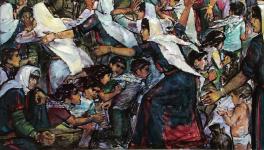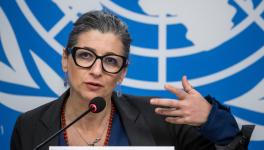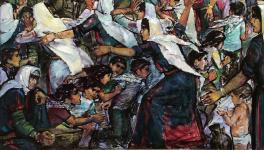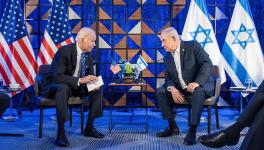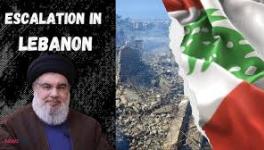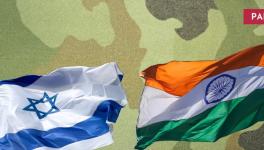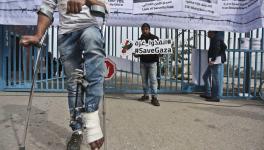The Agonies of Susan Rice: Gaza and the Negroponte Doctrine
In the dark of night, on 14 November, the United Nations Security Council met to discuss Israel’s bombardment of Gaza. As elections in Israel are on the horizon, the Israeli Defense Force conducted an extra-judicial assassination of Hamas’ Ahmad Jabari, who only hours beforehand had received a draft of a permanent truce agreement with Israel (according to Nir Hasson at Haaretz). Jabari’s assassination was followed by a barrage by Israeli aircraft and warships. A few rockets were fired from Gaza, but these have had a negligible impact. The war on Gaza is not between two armed forces, even matched, each flying the flag of a country; it is a war between a major military power and a people that it has occupied, whose means of warfare used to be the suicide bomber and has now devolved to the erratic rockets (propelled by sugar and potassium nitrate, a fertilizer, and made deadly by TNT and urea nitrate, another fertilizer). Most of the rockets fired over the past two days have been intercepted by Israel’s sophisticated Iron Dome system. No such luck for the Palestinians, who have faced US-designed F16 jetfighters and Apache helicopters and have no defensive systems.
Morocco and Egypt, on behalf of the stateless Palestinians, hastened to the UN Security Council, wanting to stop the violence and condemn Israel for its disproportionate use of force. The Council’s President, India’s Hardeep Singh Puri said, “All the statements that I heard resonated with one message – that the violence has to stop. There has to be de-escalation.”
The United States defended Israel. Susan Rice put the onus on Hamas. “There is no justification for the violence that Hamas and other terrorist organizations are employing against the people of Israel,” she said. “Israel, like any nation, has the right to defend itself against such vicious attacks.” The sentences sting with contradictions. Israel is not just a nation in this conflict, but an occupying power, who has violated a string of UN resolutions and the Geneva Convention in its treatment of the people it has occupied since 1967. Furthermore, while the United States has listed Hamas as a terrorist organization, this same political party also won relatively free and fair elections in Gaza in 2006 (at which point the Hamas leadership sent US President George W. Bush an unanswered letter with the proposal that they would accept Israel on the 1967 borders). Israel has been obdurate in its reluctance to make peace as long as the United States has backed it, and as long as its settlement policy in the West Bank can change the facts on the ground and its strangulation policy in Gaza can suffocate the population into irrelevance. Rice put her foot down in the Council. It could take no action.
Disgusting
It has been one of the clichés of Susan Rice’s tenure at the UN Security Council that she has criticized the Council for its paralysis. She has suggested, notably around Syria, that the permanent members (Russia and China) have prevented a strong rebuke of the Assad regime, and therefore have tethered any international (meaning NATO) response to the grotesque violence in that country. In the case of Israel, the shoe is on the other foot.
Rice did not call her own reluctance “disgusting,” which is the word she used to characterize the Russian and Chinese veto of the Moroccan resolution on Syria in February 2012. The White House’s paralysis on Syria reflects its own geopolitical calculations – Israel does not want a Brotherhood type government in Syria, the Turks have felt on a limb with their own forward policy, NATO partner states are unsure about the efficacy of a military intervention, and of course, the example of Libya hangs heavily like a question-mark over NATO’s Brussels’ headquarters. Rice said in February that “any further blood that flows will be on their hands,” namely on the hands of the Russians and the Chinese. The lack of motivation by Israel and Europe has hampered Susan Rice’s disposition to humanitarian intervention. A diplomat I spoke to said that he was rattled by Rice’s bluntness. The arena of international diplomacy is staid, with differences articulated mostly through gestures and silences. Rarely do diplomats speak their mind, and when they do, it is often calculated outrage. So, what did Rice’s comments indicate? It indicates perhaps that she would not like to be caught out as she had in Rwanda.
Going Down in Flames
As a member of Bill Clinton’s National Security Council in late April 1994, as a mentee of Madeline Albright, Rice was on an interagency conference call on the events in Rwanda. News had come of the killings in Kigali in response to the assassination of President Juvenal Habyarimana on 6 April. In the weeks that followed, 800,000 men, women and children were killed. The UN had already documented the massacres at Gikondo and at the Nyarubuye Roman Catholic Church. Before the call the Kibuye Massacres took place in the Gatwaro Stadium in Gitesi with twelve thousand Tutsi killed. All this had already been revealed. It was hard for the United States government to utterly ignore the events.
Rice was cagey about the news from Rwanda. “If we use the word ‘genocide’ and are seen as doing nothing,” she said on the phone call, “what will be the effect on the November [congressional] elections?” This remark shocked the others on the phone, who recounted it to Samantha Power (then a journalist, who wrote it up in The Atlantic). Rice disavowed the sentiment. She later told Power, “There was such a huge disconnect between the logic of each of the decisions we took along the way during the genocide and the moral consequences of the decisions taken collectively, I swore to myself that if I ever faced such a crisis again, I would come down on the side of dramatic action, going down in flames if that was required.” Power’s article became the centerpiece of her Pulitzer Prize winning book A Problem from Hell: America and the Age of Genocide (2002).
Samantha Power should have read Mahmood Mamdani’s book on Rwanda (When Victims Become Killers: Colonialism, Nativism and the Genocide in Rwanda, 2001). It would have given her the historian’s view. In his book on Darfur (Saviors and Survivors: Darfur, Politics and the War on Terror, 2009) Mamdani writes, “Rwanda is the guilt that America must expiate, and to do so, it must be ready to intervene, for good and against evil, globally.” But this is the wrong lesson drawn by Power and others. The West had already intervened in Rwanda, with the French creating a sanctuary for fleeing Tutsi (Operation Turquoise) and the US backing the Rwandan Patriotic Front and its leader Paul Kagame. Rather than struggle to create a political solution, the US “signaled to one of the parties that it could pursue victory with impunity. This unilateralism was part of what led to the disaster, and that is the real lesson of Rwanda.” Mamdani argues further, “Fostering hopes of an external military intervention among those in the insurgency who aspire to victory and reinforcing the fears of those in the counterinsurgency who see it as a prelude to defeat are precisely the ways to turn Darfur into Rwanda. Strengthening those on both sides who advocate a political settlement to the civil war is the only realistic approach for ending the violence.” These are wise words that would apply to Syria and Israel-Palestine – but such wisdom has no role in the councils of war-makers.
The Darfur Crucible
The guilt over Rwanda shadowed the liberal interventionists in their assessment of Darfur. The colonial, ecological and political details of what was taking place in Sudan were of no consequence. What was important was for the United States to throw its full military muscle into stopping the killings in the Sudanese province. UN sanctions and African peacekeepers were not enough. The US needed, Rice said in a speech at Johns Hopkins University in 2007, “to turn the screws.” In that speech Rice bemoaned the recalcitrance of the Bush administration to remain steady in its use of the term “genocide.” “Such language games shock the conscience,” she said perhaps with an ear to her own games ten years before. If the US did not stand firm and act firmly it would ruin US credibility and damage “our already diminished international standing by the Administration’s seemingly empty threats.”
Zachariah Mampilly, who teaches at Vassar College and is the author of Rebel Rulers: Insurgent Governance and Civilian Life during War, told me that in this speech Rice “vacillates between genuine outrage at events going on in Darfur and the importance of demonstrating US power. She refers to US inaction (i. e. not bombing Sudan) as ‘cowardly’ and implies that the US should act in response to ‘taunting’ from Khartoum.” Rice’s “blueprint for unilateral military action against a regime for ostensibly humanitarian purposes” was “essentially the model pursued in Libya,” Mampilly suggests.
Rice called for a serious cocktail of financial sanctions against Khartoum and military action by NATO and the US. In an op-ed in the Washington Post in 2006, Rice (with Anthony Lake) asked, “Will we use force to save Africans in Darfur as we did to save Europeans in Kosovo?” The Kosovo example framed the Sudan conflict. Calls for a timid “no-fly zone” had to be swatted away. Rice wanted something more muscular. “Rather than stand-off air strikes against defined targets, maintaining a no-fly zone would require an asset-intensive, 24 hour per day, 7 day per week, open-ended military commitment in a logistically difficult context….In short, [a no-fly zone] would require many of the same steps that are necessary to conduct the air strikes” to strike “Sudanese airfields, aircraft and other military assets,” including intelligence assets. In other words, the “no-fly zone” would no longer simply allow the Sudanese Air Force to act in Darfur, but it would mean an air war against Sudan. The liberal interventionists redefined the “no-fly zone” into a full-scale air assault. No wonder that the former head of the Arab League, Amr Moosa, went into a tizzy when the aerial bombardment began on Libya in March 2011 (he had to be summoned to stand beside the United Nation’s Ban Ki-moon to repent for his hastily critical remarks).
On the Side of Dramatic Action
When Barack Obama began his run for the presidency, the liberal military interventionists gathered around him. Rice and Samantha Power were his foreign policy advisors. They came into his administration, Rice as ambassador to the UN and Power as Obama’s Special Assistant. They were the ones who pushed hardest for intervention in Libya, and they succeeded. Syria is simply the next station on their Calvary Road, although the geopolitics of the region has stopped their liberal messianism.
Obama is a little more hesitant than the Rice-Power team of interventionists. He telescoped this in his The Audacity of Hope, where he wrote that while the US has a “moral obligation” for people who suffer under totalitarian states it should not act unilaterally with military force to free them. “Nor do I mean that we round up the United Kingdom and Togo and then do what we please,” he added. What was needed was “the hard diplomatic work of obtaining most of the world’s support for our actions.” These fine words are not in display. Last week, the US lined up Israel and Palau to fight back against a UN General Assembly vote to condemn the US embargo of Cuba, with the final tally being 188-3. In 2002, Ambassador John Negroponte enunciated a doctrine that promised the US veto to block any criticism of Israel in the UN bodies. The US has used its veto more than another of the other four permanent members of the UNSC – and most often this veto was used to prevent any criticism of Israel’s actions, whether the invasion of Lebanon or the ceaseless military action against the Palestinians (notably Gaza in 2006 and 2009), or indeed the settlement building in the West Bank that is taking place in contravention of the Geneva Conventions. Rice’s operation in the UNSC on November 14 on the bombardment of Gaza is part of Negroponte’s sorcery.
Selective Outrage
The moralism of Rice and Power does not extend to the victims of Atlantic imperialism. Genocides are only those when the perpetrators are not among the Atlantic powers. The long finger is pointed at the Eastern Europeans and the Africans – never at the United States government or NATO and never Israel. Thousands certainly died in Kosovo, but hundreds of thousands died in Iraq and East Timor – two states where the US was either the perpetrator or the benefactor. The word “genocide” has been sequestered to US imperial ends, with Rice and Power disgusted with the violence of others but not of themselves.
There is no disgust at the consistent egging on by the US of the Pakistani military to act against its own people, the most egregious being the campaign in the Swat Valley where hundreds of thousands of people lost their lives and were rendered displaced. An Amnesty International briefing pointedly noted, “The Pakistani government’s response to the rise of insurgents in the NWFP’s Malakand Division (mainly in the Lower Dir, Buner, and Swat valley) and in the Tribal Areas fluctuates between launching often indiscriminate and disproportionate military operations that harm mainly civilians and abandoning Pakistani citizens to abusive militant groups. Security forces deployed in government operations often fail to differentiate between civilians and militants and use disproportionate force, causing civilian deaths and injuries and destroying civilian property. Such disregard for civilian life and civilian infrastructure, such as homes and schools, is common throughout the region.” It is not just the Pakistani government that came in for criticism by Amnesty, but its “international backers – notably the United States,” who have said that the aim is not to protect civilians but to pursue “military and counterterrorism objectives, with often fatal consequences for civilians.”
There was no disgust either in the US policy in Central Africa. While a Senator, Obama sponsored a bill (PL 109-456) that called on the US government to withhold aid to neighboring countries that destabilize Congo (the co-sponsor was Hillary Clinton). US allies Rwanda and Uganda are serial destabilizers. When Rice was Assistant Secretary for African Affairs in the Clinton administration, she elaborated the idea of African Renaissance leaders, with two in particular to be celebrated – Yoweri Museveni of Uganda and Paul Kagame of Rwanda. Both of them have invaded Congo twice (1996 and 1998) with US backing. The International Court of Justice has found Uganda responsible for crimes against humanity and war crimes in the Congo, and the Spanish Courts have issued arrest warrants for forty top Rwandan officials for similar crimes. The US has remained tight-lipped, despite the millions dead.
As Maurice Carney (Friends of the Congo) told me, “In support of Rwanda and Uganda’s invasion of the Congo, Susan Rice exclaimed anything is better than [the late Congolese leader] Mobutu. In the late 1990s, the Clinton Administration suppressed a United Nations report that inculpated US ally Rwanda who committed gross atrocities, crimes against humanity and war crimes in the Congo. The United Nations built on the 1990s report (then called the Garretón Report) and published a comprehensive 600 plus page report entitled Report on the Mapping Exercise documenting the most serious violations of human rights and international humanitarian law committed within the territory of the Democratic Republic of the Congo between March 1993 and June 2003 [August 2010]. The report said in effect that if tried in front of a competent court, the crimes committed by US ally Rwanda in the Congo may be classified as genocide.” Asked by an AP reporter about this report, Rice remained silent.
Rice was not disgusted. Her disgust is not moral. It is calibrated to the interests of US foreign policy. No wonder Obama wants her as his Secretary of State. She would articulate perfectly an imperialist foreign policy in the language of human rights and outrage. That contradiction is Susan Rice’s agony.
Get the latest reports & analysis with people's perspective on Protests, movements & deep analytical videos, discussions of the current affairs in your Telegram app. Subscribe to NewsClick's Telegram channel & get Real-Time updates on stories, as they get published on our website.









